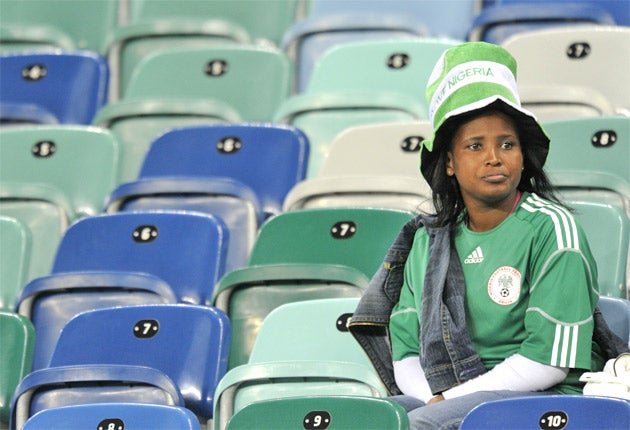Nigerian leader suspends team over poor show at World Cup

Nigeria did not linger long in South Africa but they have entered the World Cup pantheon of sore losers as the government yesterday suspended the entire national team and federation for two years in response to the country's early exit from the football tournament.
Nigeria is facing a confrontation with world football's governing body Fifa after announcing that the Super Eagles were being unilaterally withdrawn from all international competition with immediate effect.
The government in Abuja said it had set up a "World Cup task force" to look into its campaign and would be auditing the national federation after accusations of corruption. A statement on state television said that President Goodluck Jonathan was taking the drastic action to "enable Nigeria to reorganise its football".
It is against Fifa regulations for governments to interfere in the running of national football federations. However, the ultimate sanction that the Swiss-based organisation can wield is suspension from its competitions – and so it is unclear what action, if any, can be taken against a country that has suspended itself.
Fifa officials said they had not been officially informed of Nigeria's suspension but insisted that political meddling would not be tolerated. "Fifa's position regarding political interference in football is well known. Our statutes do not allow for any political interference," the footballing body said in a statement.
The action by the Nigerian government surpassed even France where coach Raymond Domenech yesterday appeared before a parliamentary committee to explain Les Bleus' South African debacle, which saw them finish bottom of their group.
Africa's most populous nation has traditionally been one of the continent's main providers of footballing talent, but in recent years this has failed to translate into success for the national team.
Nigeria went out in the first round of the 2010 World Cup without winning a match. The team lost its opener to one of the tournament favourites, Argentina, by a single goal and then lost to comparative minnows Greece after having a man sent off. Needing a win in their last match against South Korea, they managed only a 2-2 draw.
Nigeria were among five African teams to fall at the first hurdle with only Ghana, who meet Uruguay in tomorrow's quarter finals, progressing. The suspension of the Nigerian team follows corruption allegations involving the national federation in the build-up to the tournament in South Africa. "If any financial misappropriation is discovered, all officials responsible will be held accountable," said Nigerian government advisor Ima Niboro.
Nigeria, Africa's leading oil producer, suffers from endemic graft and props up the Transparency International world corruption league table. Since taking over from the deceased Umaru Yar'Adua, President Jonathan has taken a number of high-profile steps to combat corruption, which have won cautious praise from Western diplomats.
Nigeria's on-field disappointment was matched by disorganisation off the pitch. The team was caught up in a pre-tournament stampede after a hastily arranged friendly against North Korea in the Johannesburg township of Tembisa went wrong. Star player John Obi Mikel withdrew before the tournament citing injury problems but was accused in Nigeria of looking for excuses to withdraw.
The West African nation has long been looked to turn Africa's immense footballing talent into World Cup success. The nation's high point so far came at the 1996 Olympics where they won gold.
At the time, the victory was seen as a possible prelude to a golden age of African football, but subsequent performances have been largely underwhelming. Two years earlier the Super Eagles came within one goal of reaching the World Cup quarter finals but their major tournament performances have mostly gone backwards since.
Join our commenting forum
Join thought-provoking conversations, follow other Independent readers and see their replies
Comments
Bookmark popover
Removed from bookmarks